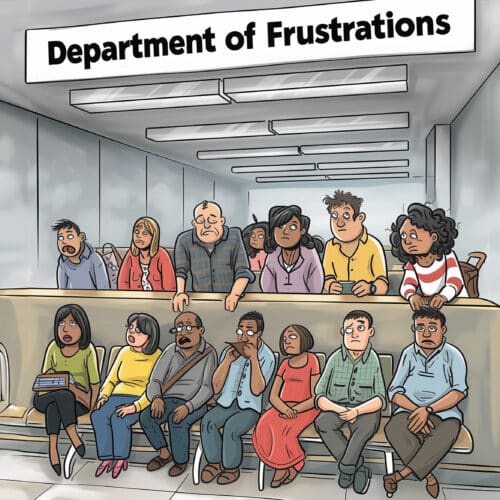“Customers will never love a company until the employees love it first.”
– Simon Sinek
Imagine navigating simple directions to the corner store with a map that details every blade of grass and crack in the sidewalk, as well as information on where each dog lives (yes, I would like that) and the color of the drapes in the windows. For me, annual employee engagement surveys are often the same kind of exercise. The answers to all those lofty questions always fall into the same categories. And at the end of the survey day, it always comes down to one crystal clear answer: “We need better leadership.” We invest untold amounts of money in these surveys, akin to buying night goggles and enhanced GPS software to get to that corner store a few blocks away. Yet, often, these tools only lead us in circles. Why? Because they give us an excuse to spend all of our time and energy on the logistics of the survey…and the reporting of the survey…and the action planning around the survey…and by the time we get to our rather unimpressive implementation, guess what? It’s time for a new survey!
 Employees are not stupid. They can see what we’re doing. Just ask them. Ask them how effective the annual surveys are and whether they believe there’s a better way to get real life change going on the ground where they live. The hard truth is that they need leaders who rely on a complex and lengthy process to have a dialogue that leads to change that matters to them and to the organization.
Employees are not stupid. They can see what we’re doing. Just ask them. Ask them how effective the annual surveys are and whether they believe there’s a better way to get real life change going on the ground where they live. The hard truth is that they need leaders who rely on a complex and lengthy process to have a dialogue that leads to change that matters to them and to the organization.
We say surveys are about culture. In many organizations, surveys are more about acting as if we care about culture and then doing it our way anyway.
Transform your workplace.
Start building a culture of trust and accountability today.
Workplace Culture Requires Real Leadership
 Culture in an organization is about providing people with what they need to do their jobs, ensuring management support, giving them a sense of belonging and contribution on their teams and providing them with opportunities to grow. It’s really not complicated. How to do all that is also not complicated. It comes down to leadership at every level and enabling your managers to get the job done for their teams and then working together and connecting dots across the organization to ascertain what is working, what isn’t, and how you can ensure it’s all delivered equitably.
Culture in an organization is about providing people with what they need to do their jobs, ensuring management support, giving them a sense of belonging and contribution on their teams and providing them with opportunities to grow. It’s really not complicated. How to do all that is also not complicated. It comes down to leadership at every level and enabling your managers to get the job done for their teams and then working together and connecting dots across the organization to ascertain what is working, what isn’t, and how you can ensure it’s all delivered equitably.
Instead, however, it’s human nature for leaders to cling to processes provided by “experts” who tout the science underlying their work but often can’t show that it actually works – as in a causal impact. So we hire them, we spend a ton of money on them and then we blame them for all of that not working when we do our next survey and the results are underwhelming or alarming. But the truth is it’s like you blaming the compass for not getting you to the corner store. Perhaps the compass is fine, but it wasn’t what you needed. In the case of organizational leadership, maybe the problem is that your team isn’t working together, doesn’t want to work together or doesn’t know how to work together. If any of that sounds like you, don’t think a survey can fix it! You’d be far better off putting your dollars and cents into leadership and team development. True change in organizational culture starts with leaders willing to introspect and lead by example.
A Simple Map to the Corner Store: A Blueprint for Cultivating a Positive Culture

- Trust as the Cornerstone – Trust is the bedrock upon which all successful organizations are built. It’s the equivalent of a team having unshakable faith in each other and not the compass. Without it, everything you try to do together will fall short of where it could have landed with it.
- Embracing Constructive Dissent – Imagine an organization where dissent is not only tolerated but welcomed, much like a think tank where diverse ideas spar in the pursuit of excellence. Encourage open dialogue and constructive debates. Now you don’t need a compass. The team lands on the simplest, right answers without external tools.
- Leadership Commitment – True cultural transformation begins at the top. Leaders must not only chart the course but also walk it while connected to each other with trust and respect. And commitment doesn’t just mean words. It means when you walk out of those difficult meetings where decisions were openly debated and made that you don’t agree with, you don’t participate in the meetings after the meeting and undermine that. You walk the talk of trust and commitment with respect for the process and the team rather than focusing on feathering your own nest.
- Accountability – In a high-functioning team, accountability is key. This means holding each team member accountable with consequences for not adhering to commitments and deliverables required for the organization to succeed. And it means doing this directly with each other. A culture of accountability is a great culture when it’s built on trust, healthy conflict, and commitment. Your best people will rise and grow into leadership positions knowing that high performers are rewarded and those who are not willing to do their part as agreed will fall behind or part ways.
- Clarity and Unflinching Focus on Collective Results – We care about workplace culture not only because we want to experience a great place to work in our day-to-day, but because we want to achieve great things together. To do this, we must adopt a constant focus on our goals and actions to reaching them. We must be undistracted by potential other goals and keep reminding each other of this commitment.
Elevate your leadership.
Invest in development that drives real cultural change.
The Power of Regular Dialogue
 The idea that annual surveys are the best way to gauge organizational health is popular, and if it’s working for you, bless you. To me, the resources spent in time and money on these efforts are often wasted when investment in your leadership and managers would result in far better returns. Frequent, honest conversations with team members offer insights no survey can match. It’s akin to ground-level reconnaissance versus satellite imagery. If leaders can’t trust each other to self-reflect and report on that honest feedback for the good of the organization, or if they aren’t equipped to handle it, that’s a critical diagnostic in itself.
The idea that annual surveys are the best way to gauge organizational health is popular, and if it’s working for you, bless you. To me, the resources spent in time and money on these efforts are often wasted when investment in your leadership and managers would result in far better returns. Frequent, honest conversations with team members offer insights no survey can match. It’s akin to ground-level reconnaissance versus satellite imagery. If leaders can’t trust each other to self-reflect and report on that honest feedback for the good of the organization, or if they aren’t equipped to handle it, that’s a critical diagnostic in itself.
Workplace culture is not a metric; it’s the lifeblood of an organization. It requires ongoing attention, adaptation, and action. It’s always been about leadership and always will be. So why not get started on investing in your leaders and managers to do what we know works. Use their eyes and ears for your survey. But only after you’ve helped them understand the challenges of getting that right and the pain of self-reflection required for the journey. Meet you at the corner store!
“Our company’s official policy is one of inclusion and respect. Excluded from that are any ideas contradicting our CEO’s.”
– Scott Adams
Beyond Surveys: Let’s craft a thriving workplace culture together.
Contact PointerWise to start today!






